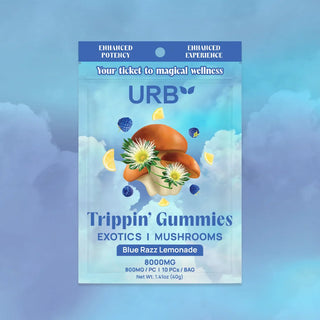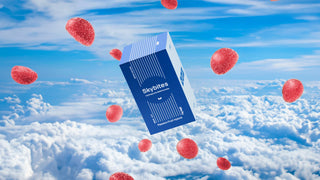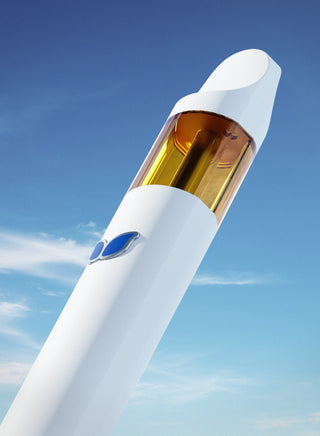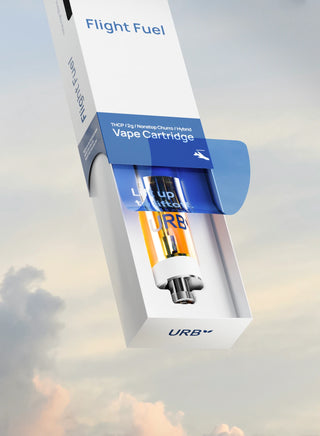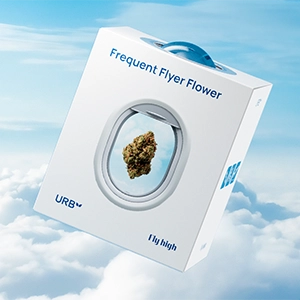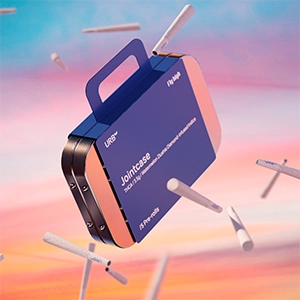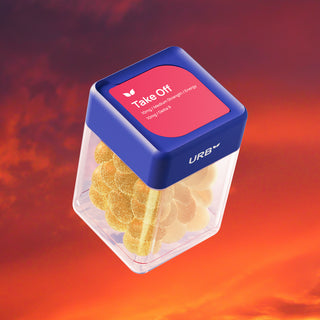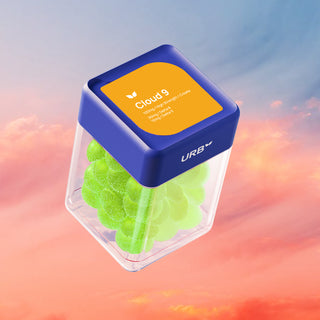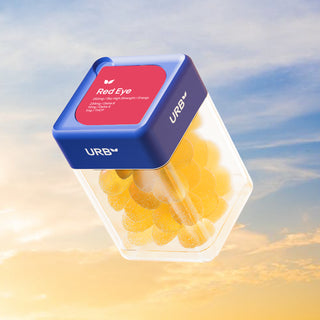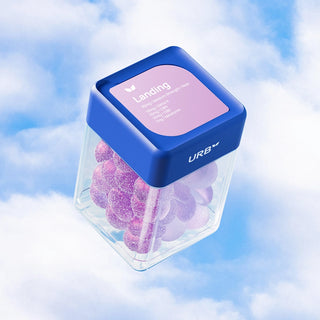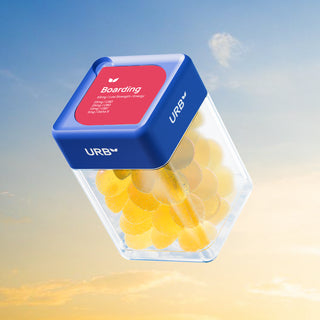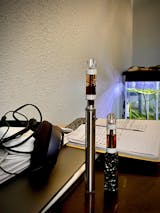It’s not just that their names look similar; the non-intoxicating cannabinoids CBG and CBC are often compared by the unique roles they play, both in the cannabis plant and in your endocannabinoid system.
So what’s the difference, and what do they actually do? We’ll cover the science, the benefits, and the nuances, so you can confidently decide if CBC, CBG, or a combo of both fits your personal cannabis routine and flight path.
Ready to decode the real difference between these lesser-known cannabinoids? Let’s get into what makes CBC and CBG worth knowing, and even better, worth trying.
CBD vs CBC: At a Glance
Both CBC (cannabichromene) and CBG (cannabigerol) are non-intoxicating minor cannabinoids that play distinct roles in how cannabis interacts with your body. CBC is often linked to calm, balance, and body-centered relief, while CBG supports clarity, focus, and mental energy.
Though they act on different receptor systems within the endocannabinoid network, CBC and CBG complement each other beautifully, working better together for a more balanced, full-spectrum cannabis experience.
Defining Cannabinoids: What Are CBC and CBG?
Cannabinoids are the primary “active ingredients” in cannabis and hemp plants. While CBG and CBC are classified as minor cannabinoids, they may still impart some very major effects.
-
CBG (cannabigerol): While CBG is comparatively rare—typically comprising less than 1% of most strains—it plays a vital role as the “mother cannabinoid” from which others are formed. Typically described as gently focusing and clarifying, it’s believed that CBG may moderate some of the intoxicating effects of Delta 9 THC.
-
CBC (cannabichromene): This compound is the third most-prevalent cannabinoid after CBD and THC. And while it doesn’t impart the same intoxicating effects as THC, research suggests CBC may be a potent ally in the fight against pain, anxiety, and other symptoms.
While there are obvious differences between CBC and CBG, in one sense they’re the same in that they both interact with the endocannabinoid system (ECS), a vital bodily network that helps control such functions as memory, immune function, pain response and more. However, since CBC and CBG target different receptor cells in the ECS, their effects are somewhat different, but the two compounds may actually work best when they’re combined.
Want to take a closer look? Head to our deep dives on CBG and CBC.
Key Differences Between CBC vs CBG
What’s the difference between CBC and CBG? While they’re both derived from the same source in the cannabis plant, the acidic compound CBGA, their stories diverge from there. CBGA undergoes an enzymatic reaction to become CBG, while a different reaction first produces CBCA—CBC’s acidic precursor—and eventually CBC itself.

What happens when CBG and CBC meet the endocannabinoid system? It’s important to understand that the ECS contains several different receptor types, each of which is linked with specific effects. The best-known of these are the CB1 and CB2 receptors, which are broadly associated with motor control, memory, and anti-inflammatory effects, among others. There are also TRPV1 and TRPA1 receptors, whose primary roles are to modulate our perception of pain. CBC and CBG target different receptor types.
While CBC has a weak affinity for CB1 and CB2, it bonds strongly with the TRPV1 and TRPA1 cells, where it exerts its body-centered and relaxing effects. Meanwhile, CBG binds more directly with the CB1 and CB2 receptors, imparting potentially focus-enhancing, energizing, and clarity-supporting therapeutic benefits.
These interactions are the basis for our understanding of how the CBC vs CBG cannabinoids may have functional use in supporting mood, inflammation, and neuroprotective properties.
How Do CBC and CBG Effects Compare?
Since they interact with the body through different receptor cells, the effects of CBG and CBC are complementary, not competitive. Think of them more like a balanced duo, each offering its own lane of support.
-
CBC: This cannabinoid is generally described as providing gentle body-centered effects. Because it targets the TRPV1 and TRPA1 receptor cells, which play a role in pain perception and related functions, the CBC cannabinoid is associated with a subtle mood lift, gentle relaxation, and a supportive calm.
-
CBG: The CBG cannabinoid is typically framed in terms of gentle cerebral effects. Interfacing with the endocannabinoid system’s CB1 and CB2 receptors, CBG is associated with sharper focus, greater clarity, and a potential energy boost.
Together, CBC and CBG offer two distinct routes to balance: one working through the body, the other through the mind. Use them individually for targeted support, or layer them to create a more personalized, full-spectrum cannabis experience.
Potential Benefits of CBC vs CBG
Since minor cannabinoids have been studied more recently than THC or CBD, it’s still a bit early to claim specific benefits. However, drawing on pilot studies and a wealth of anecdotal evidence, some potential benefits of CBC and CBG are already emerging.

Here are just a few:
-
CBC: Described by some as balancing, calming, and mood-supporting, this cannabinoid’s effects typically center on the body rather than the mind. Some studies suggest its potential as an anti-inflammatory agent.
-
CBG: Often characterized as energizing, focus-enhancing, and clarity-promoting, this cannabinoid is prized as an anxiety-fighting tool by some. Some early studies also point to its neuroprotective potential, sparking interest in how CBG may help support cognitive function and mood balance over time.
As with all cannabis compounds, it’s important to stress that benefits vary by person and depend on product formulation, terpene profile, and your own unique body chemistry.
Better Together? The Entourage Effect
For decades now, researchers have suspected that the compounds in cannabis might actually work in synergy. Today, this theory, called the “entourage effect,” supports the notion that, taken together, cannabinoids such as CBC and CBG are far greater than the sum of their parts.
At Urb, we don’t just believe in the entourage effect; we design for it. Our formulations are built around synergistic blends that combine cannabinoids, such as CBC and CBG, with carefully curated terpene profiles to promote a specific mood or functional effect. Whether it’s dialing in focus without overstimulation or promoting calm without couchlock, the goal is the same: a cannabis experience that feels more intentional, more tailored, and more effective for your day-to-day.
So Happy Together: Learn more about the entourage effect.
Do CBC and CBG Have Side Effects?
Though CBG and CBC are considered safe and well-tolerated compounds, there is always the potential for side effects. Some of the most common ones associated with CBG and CBC include:
-
Dry mouth
-
Fatigue
-
Changes in appetite
These effects are typically short-lived and vary based on individual tolerance, dosage, and formulation. That’s exactly why product quality matters, and we take a rigorous, science-first approach to formulation.
Our CBG and CBC products are derived from hemp using safe, federally compliant extraction processes. Each batch is backed by verified Certificates of Analysis (COAs), giving you full transparency and proof that what’s on the label is exactly what’s in the product—nothing more, nothing less.
How to Choose the Right Cannabinoid for You
Wondering which cannabinoid is right for you? The good news: you don’t have to choose just one. These cannabinoids are highly complementary and can be layered to support your mood, mindset, and overall cannabis routine. Here are the main points to remember about each:
-
Try CBC: If you’re seeking calm, mood balance, or subtle relaxation
-
Try CBG: If you’re seeking clarity, focus, or gentle motivation
-
Try CBG and CBC together: For a blend of effects targeting specific mental, physical, and emotional outcomes
Ultimately, it comes down to the effect you’re after. We formulate both cannabinoids across several collections, so you can choose based on how you want to feel, not just what’s inside the product.
CBC vs CBG Products: Where to Find Them
On the hunt for specific, consistent, targeted effects? Here at URB, we’re always looking for ways to incorporate emerging compounds like CBC and CBG into our best-in-class functional cannabinoid blends.
You’ll find both compounds in edibles, such as our Boarding Skybites, where the two join forces with hand-selected terpenes and complementary cannabinoids to deliver a low-dose experience designed for enhanced presence. CBG takes center stage in our URB x Sili THCA Diamond Pre-Roll Party Pack, where the compound adds its focusing and clarifying effects to the bold flavors of this crowd-pleasing favorite.
Experience CBC and CBG the URB Way
CBC and CBG are two complementary cannabinoids with functional effects. While they’re both considered non-psychoactive, they’re a major part of the effect-based blends we pioneer here at URB. And while many compare CBC vs CBG, the two cannabinoids may be at their best when they’re used in combination.
New to the world of cannabinoids? Start your journey with our Cannabinoid Guide, a full tour to the wonderful world of these cannabis compounds. Ready to experience how CBC and CBG can work individually (or in harmony) for you? Check out the URB CBG and CBC collections.
CBG and CBC FAQs
Can I take CBC and CBG together?
Yes. The consensus thus far is that the CBC and CBG cannabinoids may each impart benefits. Thanks to the entourage effect, these benefits may be enhanced when taken together.
Is CBC and CBG legal?
Yes. Both the CBC and CBG cannabinoids are non-intoxicating compounds that are legal under the 2018 Farm Bill. That said, some states may restrict the sale of any hemp-derived compounds, so check local laws where you reside.
Which is better for focus: CBC or CBG?
While the CBC cannabinoid is associated with physical relaxation, the CBG cannabinoid may promote mental clarity, alertness, and motivation.
How will CBC or CBG make me feel?
While CBC vs CBG are different cannabinoids, neither of them is considered intoxicating. CBC is associated with mild physical relaxation, while CBG may promote subtle mental clarity, alertness, and motivation. It all depends on your individual body.
Will CBC or CBG show up on a drug test?
No. Because drug tests are typically designed to detect THC, neither CBG nor CBC should trigger a positive result.

